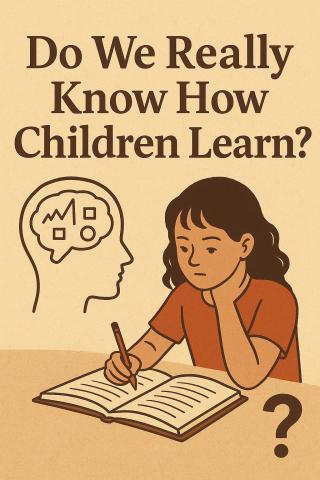
Do We Really Know How Children Learn?
Recently, PARAKH (earlier known as the National Achievement Survey) released its report. It has mapped children’s learning levels not only across states but down to the block and cluster level. The details are revealing: large numbers of children in primary and upper primary grades are struggling with foundational literacy and numeracy.
If you read this report alongside the findings of ASER (Annual Status of Education Report), which has been surveying rural India for almost two decades, the picture becomes sharper. ASER 2023 tells us that while enrollment is nearly universal, learning gaps remain disturbingly wide. These findings have remained consistent over the years, despite new policies, reforms, and digital pushes.
In short, both PARAKH and ASER confirm what many of us in classrooms already know: children are not learning as much, or as well, as they should.
But here is the bigger puzzle—these reports tell us that children are not learning. They do not tell us how children actually learn. And unless we understand that, can we ever hope to design effective solutions? In other words, we know children are not learning, but do we know how they learn?
A friend of mine, who is a member of a textbook development committee, expressed this frustration. He said, “The way textbooks are developed today is largely based on assumptions. Learning outcomes are decided in advance, and then content is created backward to achieve those outcomes. At best, we rely on broad psychological and philosophical principles. But where is the research on how these particular children, for whom these textbooks are written, actually learn?”
It’s a valid concern. We often forget that the most influential theories of child development—like Piaget’s—were developed a century ago, in a completely different cultural context. His insights were groundbreaking, but they were based on small groups of children in early 20th-century France. Can the same framework be uncritically applied to children growing up in 21st-century India?
Sociologists remind us that learning is never universal in the abstract; it is always contextual. A child’s social background, language, exposure, and lived reality shape the way they learn. In India, this diversity is immense. The world of a child in rural Bihar is not the same as that of a child in urban Bengaluru. Even within the same classroom, children carry multiple worlds inside them—family struggles, digital exposure, peer pressures, and community aspirations.
And the context today is changing faster than ever before. Consider this: many children now spend six to eight hours daily on smartphones. For the first time in history, children are consuming global, uncensored content at a scale we cannot yet comprehend. What does this mean for their imagination, their ability to concentrate, their way of processing knowledge? No one has studied this systematically. We speculate, we worry, but we don’t know.
This is why the absence of long-term, longitudinal studies on learning in India is so striking. Imagine if we had ongoing research that followed the same cohort of children over years, documenting how they learn across different stages of life and across different subjects. Such studies could revolutionize our understanding of learning—and by extension, our approach to curriculum, pedagogy, and assessment.
Instead, what we often see is a rush to “fix” education with quick solutions—introducing tablets in classrooms, adding digital content, or launching new assessment frameworks. These may look innovative, but without knowing how children truly learn, they risk becoming surface-level interventions.
ASER and PARAKH are essential because they hold up a mirror to the system. But mirrors can only show us the present. What we need is a lens that helps us see the process of learning itself—the messy, contextual, evolving journey that children take as they make sense of the world. Perhaps the next big frontier for education research in India is not just to ask, “How much are children learning?” but to seriously investigate, “How do children learn?”
- Log in to post comments
